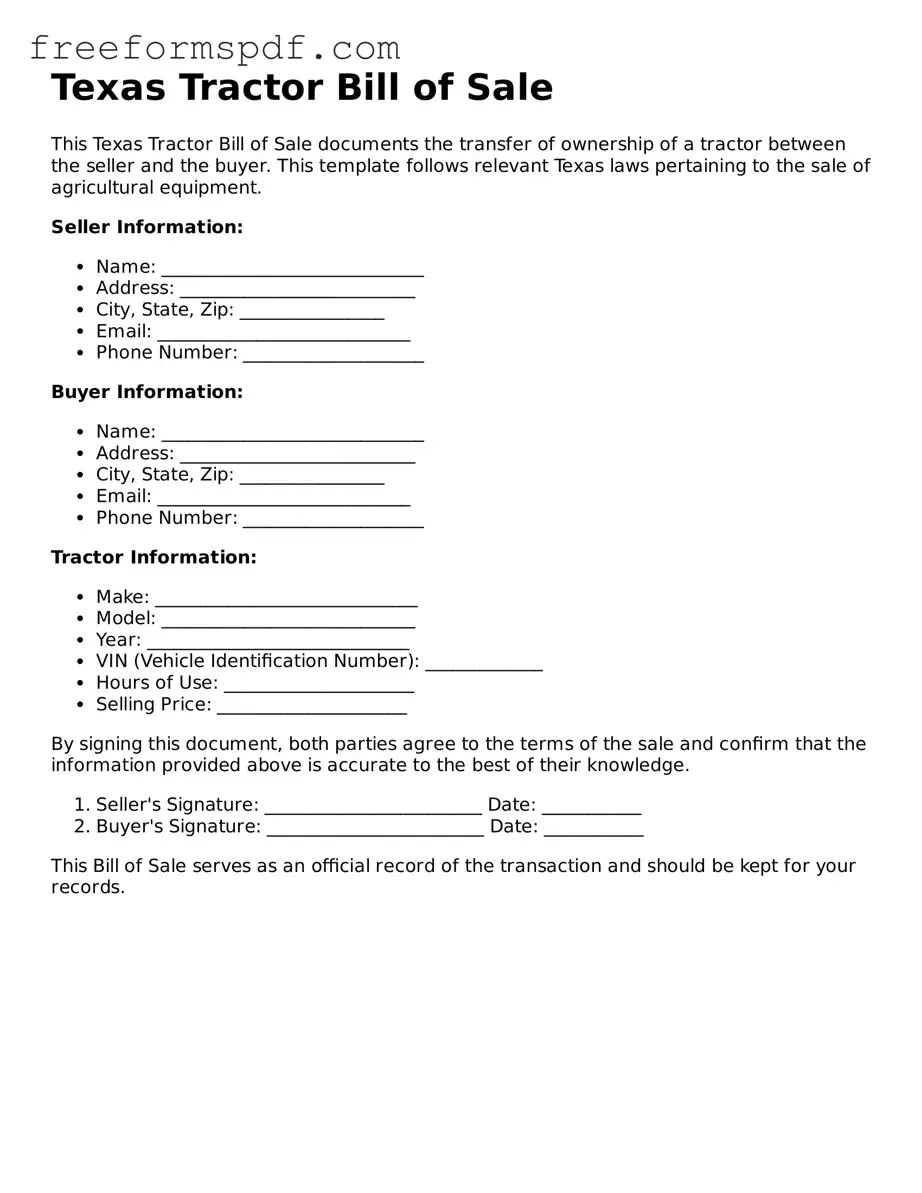Attorney-Verified Tractor Bill of Sale Document for Texas State
Common mistakes
-
Incomplete Information: Many individuals fail to fill out all required fields. Missing details such as the buyer's or seller's name, address, or the tractor's identification number can lead to complications later.
-
Incorrect Vehicle Identification Number (VIN): Entering an incorrect VIN is a common mistake. This number is crucial for identifying the tractor and ensuring that the sale is valid.
-
Not Including the Sale Price: Some people neglect to state the sale price. This omission can create confusion regarding the transaction and may affect future ownership disputes.
-
Failure to Sign: A signed document is essential for a valid sale. Without the signatures of both the buyer and the seller, the bill of sale may not hold up in legal situations.
Learn More on This Form
-
What is a Texas Tractor Bill of Sale?
A Texas Tractor Bill of Sale is a legal document that serves as proof of the sale and transfer of ownership of a tractor from one party to another. This form includes essential details such as the buyer's and seller's information, the tractor's description, and the sale price. Having this document protects both parties in the transaction.
-
Why do I need a Bill of Sale for a tractor?
A Bill of Sale is important for several reasons. It provides a record of the transaction, which can be crucial for tax purposes. It also helps establish ownership and can be used to resolve any disputes that may arise after the sale. Additionally, some states require a Bill of Sale for vehicle registration, making it a necessary document for legal compliance.
-
What information should be included in the Texas Tractor Bill of Sale?
The document should include:
- The full names and addresses of both the buyer and seller
- A detailed description of the tractor, including make, model, year, and Vehicle Identification Number (VIN)
- The sale price
- The date of the transaction
- Any warranties or conditions of the sale
Including all this information helps ensure clarity and protects both parties involved in the sale.
-
Is the Texas Tractor Bill of Sale form required to be notarized?
In Texas, notarization is not a requirement for a Bill of Sale for a tractor. However, having the document notarized can add an extra layer of authenticity and may be beneficial if disputes arise. It also provides a formal record that both parties agreed to the terms outlined in the Bill of Sale.
-
Can I create my own Texas Tractor Bill of Sale?
Yes, you can create your own Bill of Sale as long as it includes all necessary information. Many templates are available online, or you can draft one from scratch. Ensure that it meets all requirements and clearly outlines the terms of the sale to avoid any misunderstandings.
-
What should I do after completing the Bill of Sale?
Once the Bill of Sale is completed and signed by both parties, each should keep a copy for their records. The seller should also provide the buyer with any additional documentation needed for registration, such as the tractor's title if applicable. It is advisable to check with local authorities to ensure all requirements are met for the transfer of ownership.
Misconceptions
The Texas Tractor Bill of Sale form is an important document for anyone buying or selling a tractor in Texas. However, there are several misconceptions surrounding it. Here are four common misunderstandings:
-
It is not necessary to use a Bill of Sale for tractors.
Some people believe that a Bill of Sale is optional for tractor transactions. In reality, having a Bill of Sale is essential. This document provides proof of the transaction and protects both the buyer and the seller.
-
Any generic Bill of Sale will suffice.
Many assume that any generic Bill of Sale can be used for a tractor. This is incorrect. The Texas Tractor Bill of Sale form is specifically designed to meet state requirements and should be used to ensure all necessary information is included.
-
The Bill of Sale does not need to be notarized.
Some believe that notarization is unnecessary. However, while notarization is not always required, having the document notarized can add an extra layer of authenticity and can be beneficial in disputes.
-
Once the Bill of Sale is signed, the transaction is complete.
People often think that signing the Bill of Sale finalizes everything. In fact, the buyer must also ensure that the tractor is properly registered and titled with the state to complete the process legally.
Some Other Tractor Bill of Sale State Templates
Bill of Sale Truck - Varies in format and content based on state or local requirements.
The New York MV51 form is a critical document for those involved in the sale or transfer of vehicles 1972 or older, including any non-titled vehicles. This certification not only validates the transaction but also serves to legally transfer ownership between parties. Proper documentation is essential, hence supporting documents like bills of sale must accompany it. For those seeking templates to facilitate this process, visiting NY Templates can provide useful resources.
